Postgraduate courses are different from certificate courses. A PG course is usually longer in timeline than a certificate course. In most cases, a PG course will be of around 1 years’ time. If you want to pursue PG in Data Science in India, then this is the ideal time.
Data Science is an amalgamation of multiple fields, including computer science, statistics, mathematics, etc. Unlike the conventional disciplines, the field of data science is new. Initially, most people who started working as data scientists became one through inter-departmental training or certification programs.
However, individuals are increasingly interested in formally educating themselves in this field through post-graduation, as many colleges and universities have started offering such academic courses.
The question, however, remains regarding the data scientist course eligibility, its benefits, limitations, scope in a country like India, and how it can help you accelerate your career in this field. All such questions are answered in this article so that you can make an informed decision about whether a data science pg diploma is helpful for you or not.
Data Science Global Market – 2024
According to the Royal Statistical Society, despite being a thriving field, Data Science remains a cottage industry with small teams of specialists developing bespoke prototypes to their standard. Infact, India is the second highest country with over 50,000 data science opportunities – second only to the United States.
On the global level, data scientist or data analyst is one of the most in-demand positions. According to a McKinsey Global Institute analysis, the United States alone may experience a shortfall of 140,000–190,000 highly analytical workers by 2026. This shows a significant need for data science experts in the market.
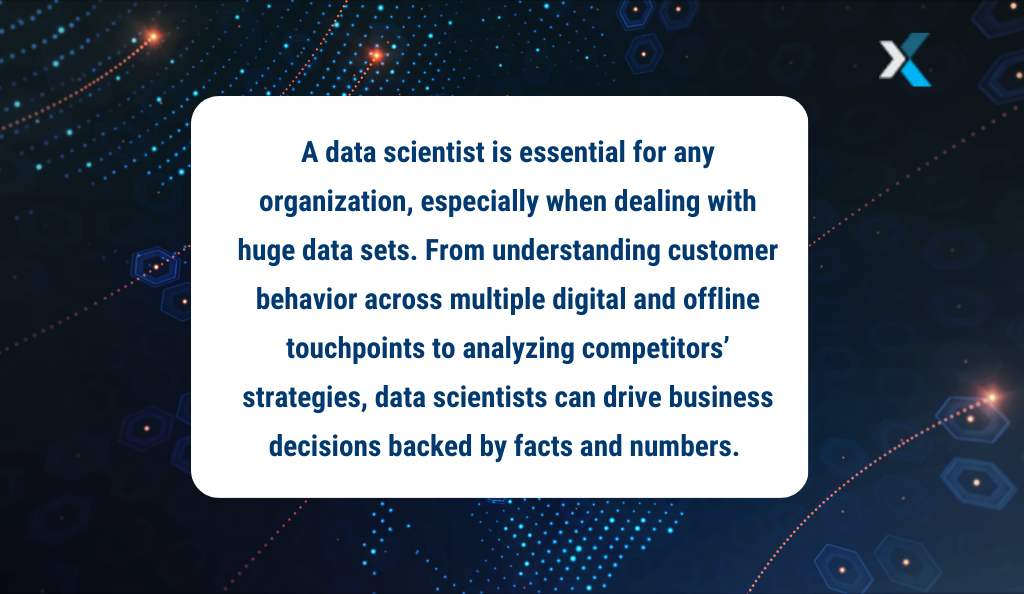
From a broader perspective, this is similar to what a business analyst does. But if you look closely, data science and business analytics are two different concepts. Business analytics is limited to business decisions, while data science involves generating, managing, and effectively using data for technical and business purposes.
More insights on how these two differ from each other are available here: Data Science vs. Business Analytics.
| AnalytixLabs offers tailor-made courses in data science. You can opt for the course in Data Science [6 months] or our exclusive PG course in Data Science [1 year] at your convenience.
All our courses are designed keeping market changes in mind. It is a harmonious blend of interactive and practical learning with self-paced learning options. You get hands-on training from the best minds in the data science domain who are field |
India’s Contribution to the Data Science Industry
Experts predict a 31.4% growth in data science and mathematical science jobs by 2030. Joining all global nations, India is also steadily embracing AI and harnessing immense analytical power.
Since Data Science is one of the most extensive applications of AI, it is only natural for India to look beyond 2023 at what the future holds. From automation platforms to business intelligence systems to implementing AI and ML in almost every domain or sector – India is leaving no stone unturned to leverage the entire potential of data science, AI, ML, and deep learning.
For instance, India is preparing to implement Automatic Train Protection System, also known as Kavach, to prevent train accidents. This automated system will let a loco pilot know whenever a train jumps signal. It will automatically take control of the brakes and bring the train to a halt when it spots another train in the same line within a prescribed distance.
This is just one of the many instances of India changing its pace and embracing machine learning, AI, and automation.
As India starts implementing AI and data science in healthcare, the army, railways, agriculture, and more – job opportunities will grow.
Today, India is only second to the United States regarding total open positions. India will top the United States by 2026 in the total jobs open for Data Scientists and analytics professionals.
Now, let’s get started on why PG in data science in India is worth it (or why not).
Is PG in Data Science in India worth it?
To understand the data science scope in India, you must first understand what it takes to complete the course. You need to weigh the time, effort, and money you put in against the value you will gain upon completion.
Let’s first understand what a typical data science pg diploma is, what you will gain from it, time requirements, cost, etc.
Then in the next section, we will discuss the eligibility criteria and other aspects.
PG in Data Science: Syllabus Content
Data science is a relatively new discipline that can be challenging to learn independently. This is because it is an interdisciplinary field, and several fields of study, from statistics to mathematics to computer science, need to be understood.
Also, several certificate programs related to data science suffer from the same problem: the structure is improper, or the content is not organized and up to date.
This issue is where doing a pg in data science in India or elsewhere can provide you a reasonable worth. This is because the course is highly structured and up to date especially if provided by a reputed college/university.
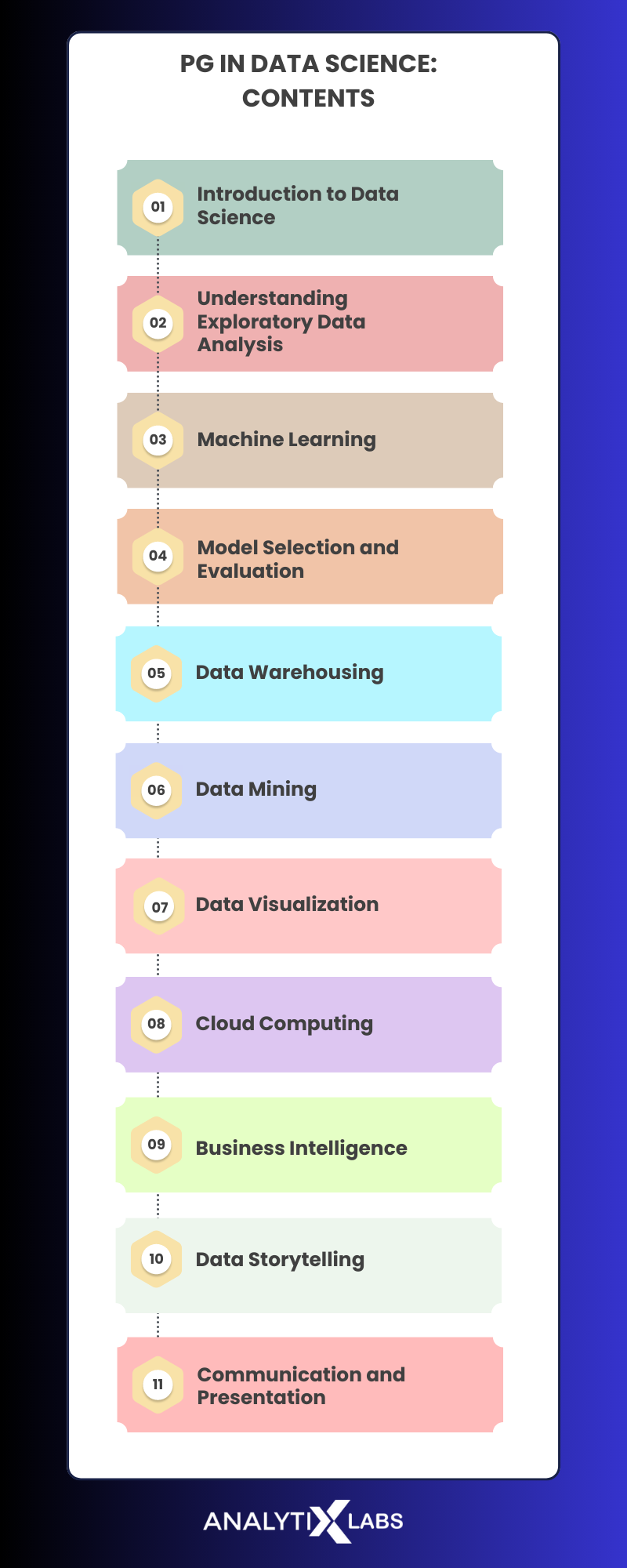
At AnalytixLabs, the course curriculum for the PG in Data Science Course looks as follows:
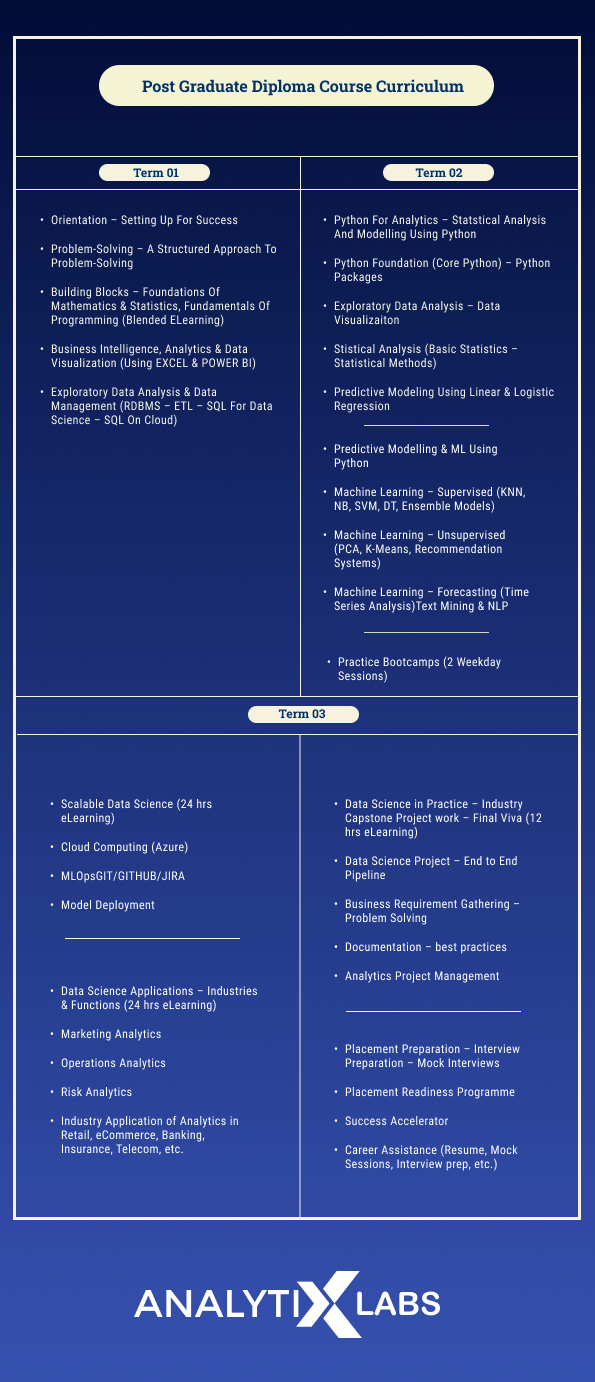
While this is a designated structure for our PG course, any PG in Data Science in India course will usually have the following structure (more or less).
- Introduction to data science
- Basic statistics and mathematics
- Database management systems
- Data structures
- Understanding the typical business problems that can be solved using data science
- MS Excel
- Data visualization tools such as Tableau
- Statistical Modeling using R, SPSS
- Machine Learning using Python
- Time Series Analysis
- Natural Language Processing
- Deep Learning
- Deployment of Models
- Big Data
This structure makes it easier for you to cover the depth and breadth of data science with ease rather than covering these topics in a sporadic manner that can eventually lead to gaps in your understanding.
Advantages of Pursuing PG in Data Science Course
A PG in data science in India can significantly help you get into the field of data science.
While ample opportunities exist to explore with a bachelor’s degree or a certification course, a postgraduate will help enhance your skills.
Here are the top 3 reasons why you should pursue PG in data science in India.
- Learn advanced skills: A certificate course will cover the basics and related concepts, but a PG course will include a deeper understanding of all the concepts. You will go a step further in understanding the scope and responsibilities of a data scientist and be more adept at leading data science projects independently.
- Earn a higher salary: This is obvious. A PG professional will earn more given the in-depth knowledge and project work to his/her credit. With a PG degree, you can directly start in mid-senior roles. Even if you begin at the entry level, you will still earn 10% more than a professional without a PG degree.
- Independently handle real-time situations: A PG course will include practical training that is more robust. You will become more adept at handling business situations with an agile approach.
| Traditionally, individuals working in the field of data science had done their graduation and post-graduation in computer science (BCS) and technology (B-Tech/M-Tech), mathematics, statistics, or even economics.
While all these degrees have their worth, a pg diploma in data science has its own worth as it is tailor-made for the field of data science. This makes it an exciting option to help you stand apart from others who have done the ‘generic’ course. |
- Networking: Even today, most job appointments are made through recommendations. When you spend one to two years in a college studying data science, you develop a bond with your peers who are all part of the world of data science. This network eventually helps you get or switch jobs, stay up to date, and expand your knowledge base.
- Added credibility to your resume: A PG diploma, especially from a good college/university, can provide credibility to your resume. It helps you explain how you got into the field, where you learned about it, and why a data science job profile is for you.
Components of Doing a PG in Data Science
We have discussed how a PG degree can enhance your career in data science. Add to this; there are several other components that you should know about when considering PG in Data Science in India.
-
Eligibility
Now, if you think that a pg in data science in India is worth it in terms of the time consumed, knowledge gained, and job profiles, it can provide you.
You must understand that the two questions- what is the eligibility for data science and what is the pg in data science course eligibility- are different. The first deals with the knowledge you need to crack an interview. In contrast, the other deals with the university/college eligibility criterion; unfortunately, both differ in many aspects.
Regarding formal education, the pg in data science eligibility, especially in India, takes a much more conservative approach. Typically following are the eligibility criteria-
- Bachelors in STEM
The applicant is generally expected to be from a STEM background, meaning they should have a bachelor’s degree in specific disciplines such as Statistics, Technology, Engineering, and Mathematics. Typical degrees include B-tech, BE, BCA, M.Sc, BA Economics, and BA Statistics.
- Minimum of 50% or 60% in an undergraduate degree
Most colleges look at your GPA and academic performance. For any diploma in data science, eligibility can range from a minimum requirement of having passed their bachelor’s degree with 50% to 60%. Specific colleges can also have a minimum requirement of up to 65% to 70%.
- Studied mathematics/statistics/computer science for one semester/two years during bachelors
Certain universities and colleges that follow some relaxed eligibility criteria also allow candidates that have studied a subject related to mathematics, statistics, or computer science in a semester. On the other hand, some require you to have studied such subjects for at least two years as part of your bachelor’s.
- Work History
The answer to the eligibility for data science postgraduate courses becomes interesting when specific colleges even allow applicants with credible work histories related to data science. However, such options are primarily available in European, British, Australian, and some American colleges and are less in India.
- Other outstanding achievements to showcase your eligibility
You must not lose hope if you are a data science enthusiast who does not meet any of the eligibility criteria mentioned above. You must work in your capacity to showcase your interest in the field.
This can include taking up freelance projects, writing blogs, articles, and research papers, participating in hackathons and solving case studies, and putting them on the GitHub repository for others to view. Specific colleges can consider this and can help you to open the door.
-
Compensation
In India, the salaries of data scientists often compete with those of doctors, software engineers, pilots, etc., i.e., the job profiles that have traditionally been considered high paying. The median salary of professionals with 0-3 years of experience has compensation of up to 7.9 LPA, 3-6 years with 10.6 LPA, 6-10 years with 15.3 LPA, 12-13 years with 28 LPA, and 12+ years with a salary of a whopping 35 LPA.
-
Data Science Roles to Explore
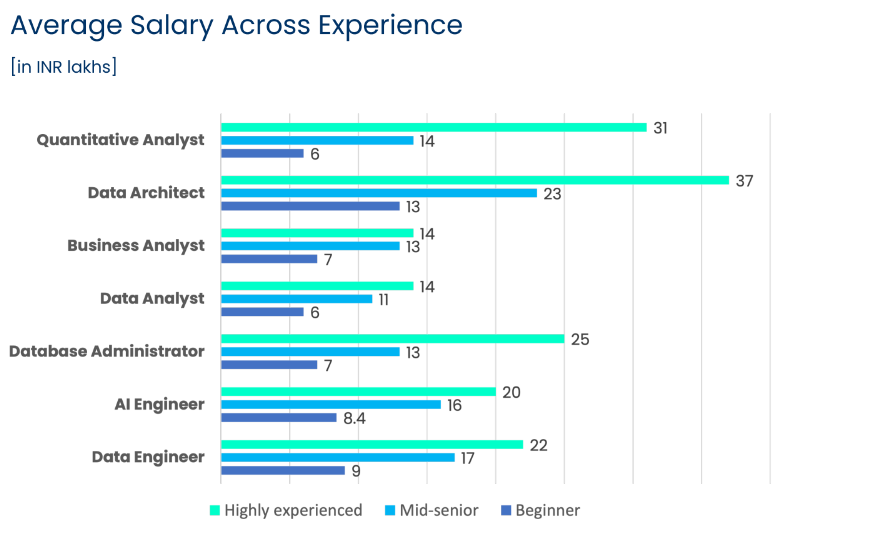
Now that you know everything about doing PG in Data Science in India, it is time to start looking at the skills you will master.
-
Skills required
When it comes to the skills that make you eligible for a job as a data scientist, they include a vast range of theoretical and practical knowledge bases that you need to have. These include-
- Descriptive and Inferential Statistics
In any interview related to data science, your knowledge of statistics will be tested for sure. This includes ensuring that you understand descriptive statistics and know the measurement of frequency, central tendency, variability, and shape. Knowledge of inferential statistics is also crucial, including an in-depth understanding of data distribution, their associated properties, hypothesis testing, etc.
Also Read: Descriptive vs. Inferential Statistics: Definitions and Examples
- Programming language
The technical round that tests your eligibility for a data science job profile includes testing you on the popular languages in the world of data science. Python and R are the ones that the companies evaluate you on to ensure that you can implement models or can start the analysis from day one.
- Database and data structures
The next important aspect is to test your eligibility by testing your knowledge of database management systems and data structures. Here, an understanding of query-based languages such as MySQL comes in handy.
Also Read: Understanding Structured Data in Big Data
- Data Visualization
The insights gained from the data analysis often need to be conveyed through charts and graphs. Companies evaluate your knowledge of tools like Tableau, Power BI, etc. Here you are typically provided with a dataset and are expected to surface the key insights using appropriate graphs.
- Knowledge of ML and AI algorithms
The theoretical knowledge of standard machine learning and deep learning algorithms is evaluated. The evaluation is done by determining that you know which algorithm to use, its advantages and disadvantages, how it works, etc.
Also read: Machine Learning Algorithms to Learn
Limitations of a PG Course
While the course has many advantages that make it worth your time, money, and effort, it also has certain limitations.
These include the cost of such courses, which can be an issue for some, and the eligibility criteria discussed later in this article, which can hinder you from taking such a course.
This is mainly due to the limited seats in India. Lastly, as of now, most companies’ data scientists have found their way to the position through self-learning, online and offline certificate programs, or learning about it in the workplace only.
Therefore, it’s not that without a PG in data science, you can’t become a data scientist.
In Conclusion: Accelerate Your Data Career
If you are already in the field of data science, doing a PG course in data science can help you accelerate your career. There are several reasons why a PG diploma can help in providing an impetus to your career ambitions, such as-
- Learn latest technologies
- Be eligible for advanced job profiles
- Be adept in communication and presentation skills
- Be a leader in making business decisions
FAQs
- Which PG course is best for data science?
Any postgraduate program that involves data science and its associated fields, such as big data, AI, and cloud computing, is a good one. Colleges that provide good PG courses in data science include IIT Roorkee, Delhi, Madras, IIM Madras, Calcutta, NMIMS, and BITS Pilani. If you wish to opt for an online medium, you can use Symbiosis Centre of Distance Learning or IIT Lucknow.
- Where can I write a data science blog?
One of the most common platforms for writing a data science blog is medium.
- Is PG in data science good?
A PG in data science can be good if you want to start in the field of data science or are in the initial years and want to accelerate your growth. A PG in data science course provides you with credibility and holistic understanding and develops soft skills like communication, presentation, etc.
- Is data science a good career?
Data Science as a career is a great option given the growth, average compensation, job satisfaction, and future possibilities.

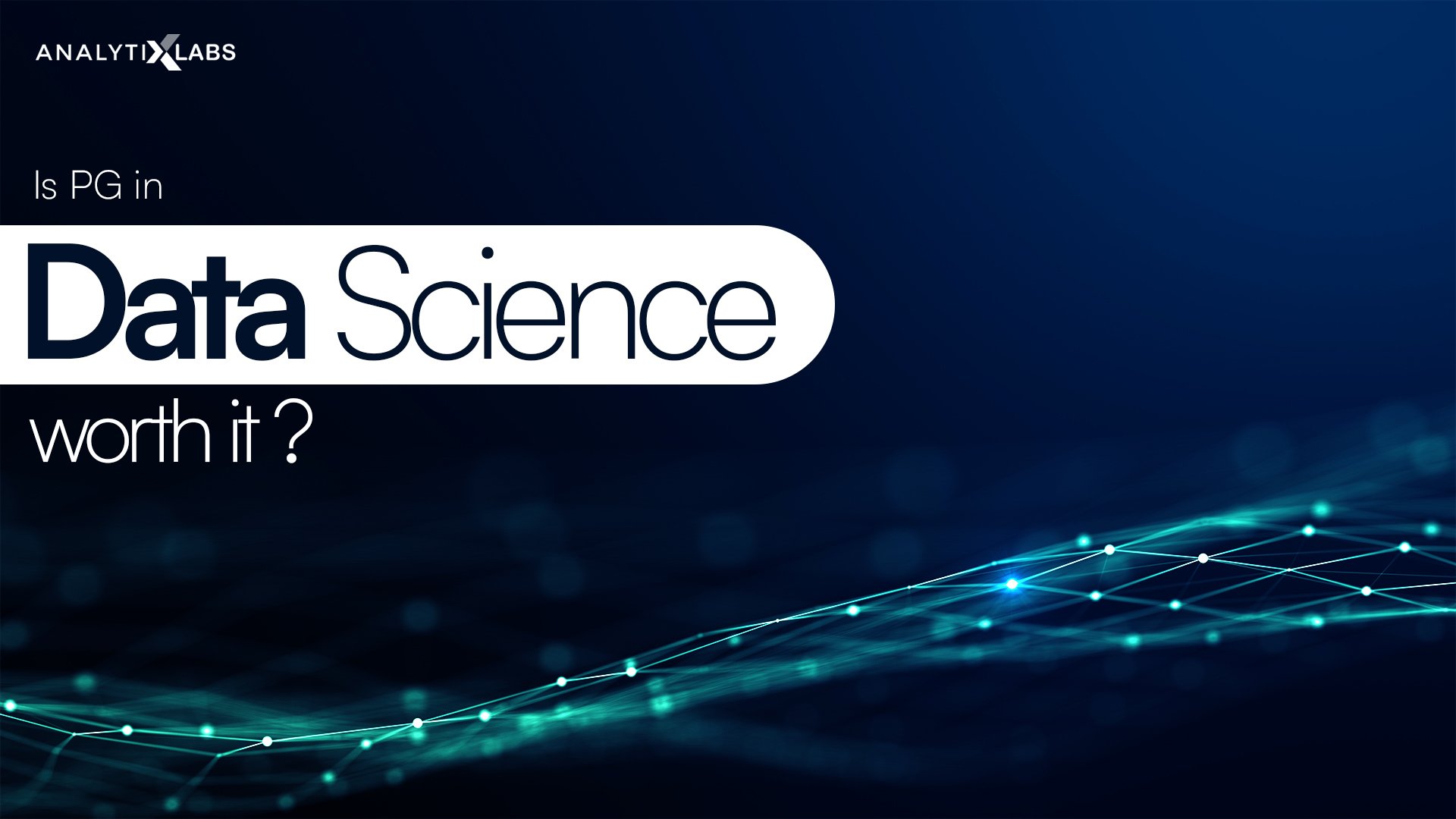



![Tree Traversal in Data Structure Using Python [with Codes] tree traversal in data structure](https://www.analytixlabs.co.in/blog/wp-content/uploads/2025/01/Cover-Image-1-370x245.jpg)


